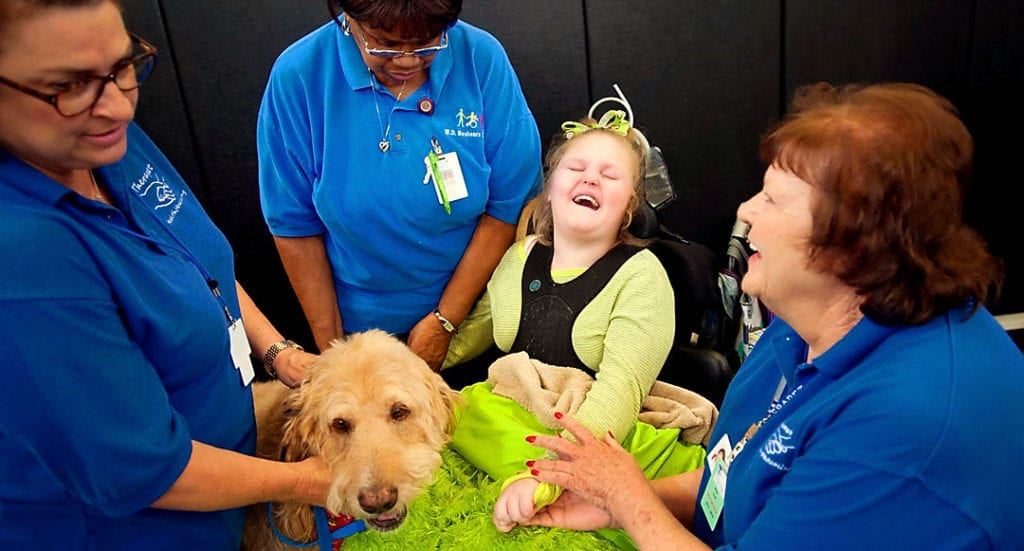Written and Photographed by Barbara King
A hospital visit can be a frightening, often pain-filled journey for a patient. Then the quiet is interrupted by the sounds of padded feet up the hallway and the animal parade has begun.
The dogs, cats and bird that make up the Therapet troupe have a purpose that is truly a mission from the heart. Therapet is an Animal Assisted Therapy (AAT), solely volunteer organization, which uses animals in visitation and therapeutic programs to promote health, hope, and healing. All the animals in the program are family pets that have been specifically trained by their owners to benefit the program.
Currently, the Therapet program consists of 90 dogs, a few cats, and even a cockatoo, who bring their loving, non-judgemental natures to assist in therapies in many different settings. What began as a small group of six or seven founding volunteers, has now grown to over 100 volunteers, bringing their dedication and passion to make a difference. Started in 1994, the nonprofit is fully funded by the generous donations of individuals and corporations who realize the benefits the animals provide in terms of helping to achieve the best patient outcomes, including better physical, social, emotional, and cognitive performances.
Carianne Sites, Executive Director of Therapet, says, “It is such a win/win for the animals, the clients, doctors, nurses, and therapists who love to work with the animals and who actually see a marked improvement in their patients when they can touch, walk and spend time with the animals.”
Lots of folks wonder how their animal can become a Therapet and as Sites explains, “We hold our pets up to the highest standards, and they must have the temperaments and personalities to be in situations that require a lot of patience and interaction.”
The animals must pass obedience testing, an application and veterinary screening, Therapet skills training sessions, temperament testing, and complete a successful probationary period. Approximately 40% of the Therapet animals are rescues. The dogs must be at least one year old, and volunteers should be at least 16 years of age.
The benefits of the Therapet program are almost too much to name, including motivation and sense of well-being, reduced anxiety, loneliness and stress, improved endurance, range of motion and strength, faster recovery from serious physical or emotional trauma, improved communication and social skills, and improvement in fine motor skills, mobility, and balance.
The Therapet volunteers and their pets get to choose visitation programs and times that suit their work and life schedules, including visits to Trinity Mother Frances Rehabilitation Hospital, Tyler ISD, East Texas Medical Center, East Texas Crisis Center, Texas Department of Corrections, Skyview Unit, Boshears Center for Exceptional Programs, Rusk State Hospital, and the Children’s Advocacy Center.
Wendy Gerard and her two dogs, Murray (weighing in at 110 pounds, a very large Labradoodle) and Yager, (a smaller beagle) are in the program, and Wendy is treasurer and Board Member for the organization. “It is really a joy and honor to be involved in this program and see the difference it can make in people’s lives,” she explained. “It is a ministry to me, and the both dogs love knowing they are ‘going to work.’ We were at the Boshears School not very long ago and a young boy was having seizures and also experiencing extreme head pain. I had Murray lay down on the floor with the boy, covered them both up with a blanket, and the boy began patting Murray’s fur, cuddled up, and immediately calmed down. There they were, with paws and feet sticking out from under the blanket, just being warm and calm and safe together.”
Holly Welmaker has been actively involved with Therapet since 1999 and had the first Dalmation, Daisy, to ever be in the program. Now she works and travels with her dachshund Riley, and normally puts in 6-8 volunteer hours a month at different locations.
“It is an absolute joy to be part of Therapet, and I can’t imagine my life without it,” said Welmaker. “When Riley sees the leash and sees me put on my blue Therapet shirt, we both get so excited to be able to help in any small way to make a life more bearable, happy, and productive.”
“It is a one of a kind experience and an incredible way to give back to the community,” she said. “When we go to the Skyview unit, the prisoners smile from ear to ear because it gives them contact and normalcy, and maybe even some hope for that brief period of time.”
Yet another unique program that Therapet is involved with is R.E.A.D. (Reading Education Assistance Dogs), which helps improve elementary level reading skills. The students are more motivated and less self-conscious reading to the dogs. “Sometimes students who are introverted will make a connection with a particular animal and really open up,” explained Welmaker. “We will notice after the session is over, that a student will be whispering a secret directly into a dog’s ear.”
The visits to local hospitals are especially rewarding, as volunteers tell stories of comatose patients that open their eyes and have tears on their face as they feel the warmth of an animal. “We have patients who ask to see a specific breed, or maybe a smaller or bigger dog, as it evokes wonderful memories of pets they had when they were younger,” said Welmaker.
Executive Director Sites says that one thing most people are not aware of is that you do not need to have a pet to be part of the program. “We have lots of volunteer opportunities available, from helping with our fundraisers, to being part of the team that goes to the hospitals, to working at Mistletoe & Magic in our booth.”
Murray, the biggest Labradoodle ever, said goodbye to me with his sweet, big wet eyes, as he curls up to get some shut-eye before he has to go back to work with Therapet.
For more information about Therapet, please visit www.therapet.org, or call (903)535-2125 or on Facebook at “Therapet.”



























